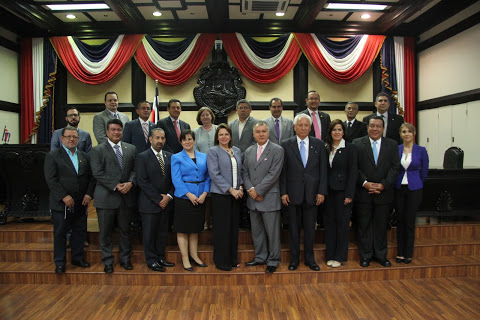
Costa Rica
Members of Parliament from Costa Rica and El Salvador strategized over progressing their respective processes of domestic implementation and ratification of the Rome Statute of the ICC on 10 July 2015 in the Legislative Assembly of Costa Rica.
Parliamentarians for Global Action (PGA) co-organised this Special Hearing on the ICC with the Parliament of Costa Rica, thanks to the leadership of PGA Member Hon. Ronny Monge Salas and the essential cooperation of the International Criminal Court (ICC).
The key-note speech was delivered by the ICC President, Judge Silvia Fernández de Gurmendi, who expressed the importance of the Universality and Effectiveness of the Rome Statute.
ICC President Fernández de Gurmendi explained the main features of the ICC system, such as the prospective and non-retroactive outlook of the Rome Statute and the independence of the Court´s organs.
High representatives from Costa Rica participated: Dip. Rafael Ortiz Fabrega, President of the Legislative Assembly of Costa Rica opened the Special session by mentioning Costa Rica´s efforts to fulfill its international commitments and express the work that the parliament carried out in 2014 for the ratification of the Kampala Amendments; Mrs. Ana Helena Chacón Echeverría, First Vice President of the Republic of Costa Rica, explained the ratification process of the Rome Statute in Costa Rica as well as highlighted the importance of International Law for Costa Rica, which is a state without an army. The special session, was also attended by the Vice-President of the Supreme Justice Court of Costa Rica, Judge Jose Manuel Arroyo Gutierrez and the General Prosecutor and Deputy General Prosecutor of the Republic of Costa Rica and several members of the Legislative Assembly of Costa Rica who discussed the obstacles and solutions for the full and effective implementation of Rome Statute.
During a Q&A session with the President of the ICC, incorrect assumptions about the incompatibility of the Rome Statute and the Salvadorian Constitution were dissipated. In particular hesitations relating to life imprisonment, surrender of nationals to the Court and national sovereignty were addressed, while generating political will to support the success of the Ratification process in El Salvador and the implementation process in Costa Rica.
Parliamentarians representing 4 political party groups of El Salvador: Alianza Republicana Nacionalista (ARENA), Frente Farabundo Martí para la Liberación Nacional (FMLN), Gran Alianza por la Unidad Nacional (GANA), Partido de Concertación Nacional (PCN), had the possibility to express the obstacles to, as well as the opportunities for achieving the Rome Statute ratification in El Salvador. They committed to further disseminate the clarifications received from the President of the ICC as well as from the other participants in the Special Hearing to boost the ratification process in their country.
Dip. Antonio Álvarez Desanti, President of the Security and Drugs Trafficking Committee, made the closing remarks, highlighting the importance for the Region of the ratification of the Rome Statute system so that no responsible for crimes against humanity, war crimes, genocide and crime of aggression finds a safe haven in their countries. He committed to continue with the already started discussion to amend the Criminal Code to include the Rome Statute crimes and principles since that will allow the effectiveness of the complementary principle.
In addition, the Special Hearing allowed to define new national strategies against the impunity and the prevention of the most serious international crimes. This event helped to establish direct channels of communication and cooperation with the highest authority of the ICC and members of different institutions and political groups in Costa Rica. The participation of high representatives of Costa Rica from the different three branches of public power showed the interest and commitment of the government Costa Rica with the ICC.
Also, the participation of several parliamentarians of Costa Rica from different political parties in this special session, raised awareness of the implementation of the Rome Statute into domestic law and the importance to interact with the ICC and receive from them crucial information about policies, administration and operations rules.
PGA is convinced that the conclusions achieved in this Special Hearing would be the basis for parliamentarians to continue advancing the processes of ratification and implementation of the Rome Statute in their country and therewith contribute to the fight for international justice.

.jpg)
.jpg)
.jpg)
.jpg)
